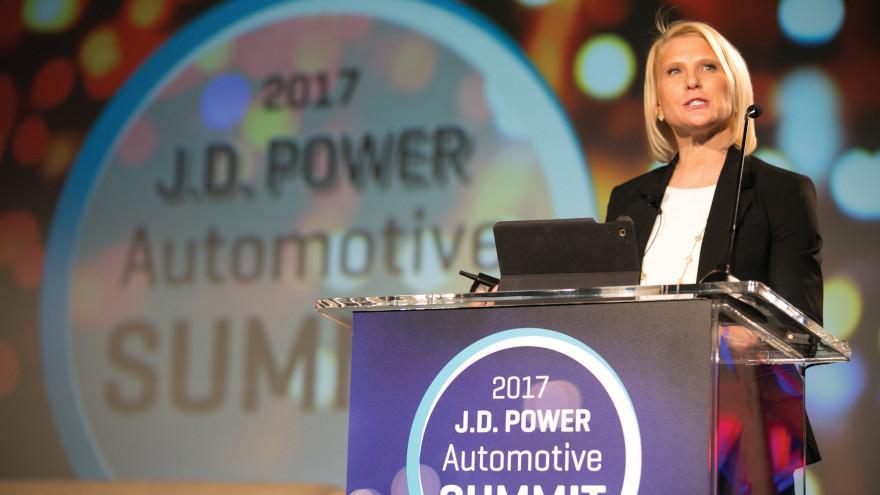Parts & service, along with used cars, helps push franchised dealer profits, optimistic valuations

Erin Kerrigan of Kerrigan Advisors. File photo provided by company.
By subscribing, you agree to receive communications from Auto Remarketing and our partners in accordance with our Privacy Policy. We may share your information with select partners and sponsors who may contact you about their products and services. You may unsubscribe at any time.
CARY, N.C. –
The service and parts piece of the franchised auto-dealer business, along with other high-margin segments like used cars and F&I, is driving profitability for these stores. And that is helping push optimism among both dealers and investors in the future value of franchised dealerships.
That’s according to Kerrigan Advisors, a sell-side adviser to dealers that released its first-ever annual dealer survey on Monday.
Among the 650 franchised dealers surveyed, 86% said they project the value of their business to either climb or remain steady over the next year (60% expect steadiness, 26% expect increases).
Only 14% of dealers surveyed foresee a decrease in the value of their business.
“I think that the headlines that we read about in the news are kind of misplaced. The auto-retail industry actually saw a slight uptick in earnings in the first half of 2019,” Kerrigan Advisors founder and managing director Erin Kerrigan said in a phone interview.
“And that’s really driven by the higher-margin parts of our business model, which is used vehicles, and most importantly, service and parts,” she said. “And i think that just seems to miss the headlines, because everyone’s fixated on new-vehicle unit sales.”
Subscribe to Auto Remarketing to stay informed and stay ahead.
By subscribing, you agree to receive communications from Auto Remarketing and our partners in accordance with our Privacy Policy. We may share your information with select partners and sponsors who may contact you about their products and services. You may unsubscribe at any time.
Kerrigan points out that even though most of auto retail revenue is attributable to new-vehicle sales, most of the gross profits is thanks to service and parts.
“That side of the business is up 27% since 2015 and is doing incredibly well. And I think dealers see that in their businesses,” she said. “They’ve also found ways to augment front-end new-vehicle gross with F&I.”
And investors are paying attention, too.
The firm has seen a 41% year-to-date hike in its Kerrigan Index, which measures the seven publicly traded auto retail stocks, through three quarters of 2019. The S&P 500, the company points out, has climbed 19%.
Added managing director Ryan Kerrigan in a news release, “Dealer optimism about their franchise values isn’t a surprise, not when Wall Street analysts see automotive as a hedge against a possible recession.
“While the news headlines tend to focus on the decline in new-vehicle sales, investors are paying more attention to industry profitability, which is growing due to the higher margin parts of the auto retail business model, namely used vehicles and fixed operations,” he said. “Earnings growth is what drives valuations higher, and that is what we are seeing in the market today.”
Another headline-grabber these days is that of changing vehicle ownership, usage and mobility. The firm doesn’t see that having an impact on franchise dealership valuations yet, however.
“The fact of the matter is that there is absolutely no clarity as to when some of these disruptive business models may or may not affect our business model and therefore, they’re not priced into the valuations of dealerships today,” Erin Kerrigan said.
“We do not know at this juncture how changes in mobility will affect the auto-retail business model. And until we have clarity, we will not see that priced in.”
Volvo leads expected valuation increases
Breaking down the data further, the Kerrigan report also included survey data on expectations for specific franchises.
Forty-three percent of dealers expect the Subaru franchise to increase in value over the next 12 months, making it the franchised most expected to see a value increase. It was followed by Toyota (30%), Porsche (29%), Volkswagen (24%) and Mercedes-Benz (22%).
“That franchise has had the longest sales improvement streak of any franchise post-recession,” Erin Kerrigan said of Subaru. “I think that just its ability to continue to take market share in what’s becoming a much more challenging auto retail environment really speaks volumes about the strength of that franchise.
“I mean, it was one of the few franchises that actually saw sales increase even during the recession,” she said. “The auto retail community feels that that’s one of those franchises that even if we get into a recession in the next few years, will likely continue to see its market share grow.”
And strong customer loyalty to Subaru certainly plays into that.
“It’s more of a recurring business model than other brands, where you’re constantly having to conquest new consumers,” Erin Kerrigan said. “With Subaru, the Subaru buyers are buying yet another Subaru as soon as they’re ready to and then they’re servicing their vehicles with their Subaru dealerships.
She added: “What we always like to say (is), the valuation of dealerships and franchises is driven by the business model of the franchise. And some OEMs have created really franchise business models and others have created pretty challenging business models, and the valuations are reflective of that.”
Meanwhile, the top five franchises projected to keep their valuations steady were Honda (68%), Toyota (64%), BMW (64%), Lexus (63%) and Mercedes-Benz (62%), the data showed.
The top five franchises to projected to see a dip were Infiniti (65%), Nissan (65%), Cadillac (55%), Buick-GMC (53%) and Acura (48%).


